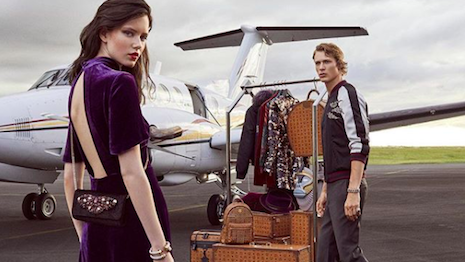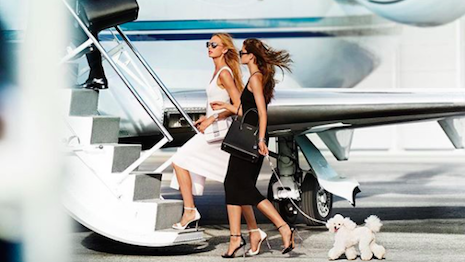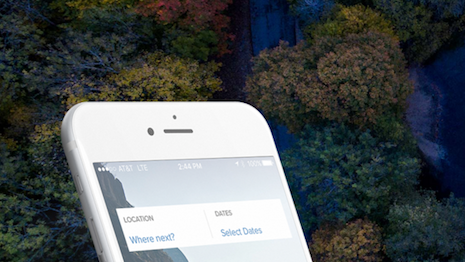As rare activities and cultural immersion have dominated the travel industry, a new report shows that business travel is still an extremely important part of hospitality.
About 31 percent of travel in the United States is business related, where travelers want less unique experiences and more convenience, according to a white paper from iSeatz. This segment of travelers in the U.S. is highly loyal due to their frequency in business trips, making rewards programs key in attracting them.
"There is so much opportunity for hotels to grow their revenue stream while boosting loyalty with the business traveler,” said Kenneth Purcell, founder and CEO of iSeatz. “Corporate travel accounts for 31 percent of the overall U.S travel market.
“Business travelers are looking for an easy, streamlined booking process and are open to booking more than rooms from hotels,” he said. “Hotel companies have an opportunity to own a larger share of wallet and extend the amount of time a guest interacts with their brand."
Business travel
About 59 percent of business travelers are part of a loyalty program from a hotel brand.
The majority of corporate travelers are between the ages of 25 to 45 and male, at 56 percent and 65 percent, respectively.
 The ultra-affluent are global. Image credit: Printemps
The ultra-affluent are global. Image credit: Printemps
These travelers are ready to spend more on things that make their trips more convenient such as late checkout and early check-in, at 87 percent and 85 percent, respectively.
About 31 percent of business travelers stay with luxury or upscale hospitality brands and 47 stay with midscale brands.
When booking their rooms, high-speed WiFi, parking, early check-in and pre-paid breakfasts are the first things these travelers look to book. High-speed WiFi and parking were at the top of the list, with 41 percent of consumers looking for these services when booking.
 Private jet travel has become more accessible to the ultra-affluent. Image credit: Michael Kors
Private jet travel has become more accessible to the ultra-affluent. Image credit: Michael Kors
WiFi and parking were followed by early check-in at 40 percent and pre-paid breakfast at 37 percent.
Additional insight
Despite facing geopolitical and technological disruptions, 2018 is shaping up to be a record year for the travel industry.
According to panelists on the “State of the Travel Industry” session at the 2018 New York Times Travel Show Jan. 26, the year ahead will continue momentum seen in 2017, after declines in 2015 and 2016 due to terrorism, currency fluctuations and notably, for the United States’ tourism sector, the Trump Administration. While the “U.S. brand” is hurting, in-demand markets such as Europe and Africa are seeing interest return while destinations including Israel and Cuba continue to attract travelers (see more).
As luxury becomes more accessible to the mass market, affluent consumers are becoming more discriminative with their travel choices.
According to a new luxury travel report by Sienna Charles, ultra-high-net-worth individuals want more opulent travel experiences and are comfortable with the high prices that go along with them. But as travel and hospitality brands seek more and more expansions, these travelers desire more exclusivity (see more).
"One of the most surprising findings from this research is the disconnect between what the customer wants and what the hotel is offering,” Mr. Purcell said “Seventy percent of business travelers surveyed were willing to purchase additional goods or services from hotels.
“With help from a proven technology partner, hotels can deliver the relevant ancillary products that their guests are looking for,” he said.
{"ct":"1Nb7D09r5DX\/ZWx7R5hdCMOEC89LCYWr\/5EuYwaxsuuF\/1hwog+GGKg8DPVuWnD2byFcMg9QxDx6uEtBX04t164IAlMS\/DbDyn6P2R2SfzqnlmYRke0cjeJpimk4JBoptj\/ippQB9IPOS6Pt3soIviPd+WzK3l2Qi4Re7eUjSHLK4PMLzc3C+BICzmOj2tsHNyUeCEg2rYuRNAqhh2ooZPvxXiZOZivckI3j9bHsp8c+UIm979NH7uvl3UuigRY6JgMQO97qTuiDHq+YUePSikQamIOssrL87kY7k5OK06QlXegKtLQuNgE9h4nE9Yd3YwQ8AdD4Yn+9iuKmxFgTgN8hjzQlc9mpjoCNRyvWv\/pRQFXEKZjgoXDnbUUe4LGsPxFz0yOck46\/rpZkiuCPUIWTW\/GLd1g7L6rgUeor\/LfzZKEGxHIu++ENXhi6kZDxs5k7d+DXIFJckktQeh8VYGsi1pmHKSXLsowgIR18SZTdGjGaoagFOSZnNNmv5xnpP5iZ6wy\/IkXIoyiAraz7mocUPVe5MLiec4ZU5VCWHiyKXuByw3ES6q4aKqbUf37iLL5Imnv40DZJzmicl0JYHhRJf5zQj01YbJUVwwJ3sJswoF530ZtxIxgPBobyr\/gLoDeA3PPm\/RhAKxLAEkaiA\/gGjmPcaJnzglIhyN3lRSOQteIwWZaAn2uqN5SCyonif0NL\/UPs5jPmB7geK5x2Gpybbgm8PuiHy3qeKrPyz\/kNxIi41w+E04GlYzzJqdksJmciQpzSLKVdyOwZD2PBXr4lJWvLRgNZpupyLe5turApvGra2wxaO1laTA8PsB8D1VR8OYB85QQcmhIrJ14tJjR5T10+yjUVF1Zuv3NchitqAR6pE3u7ePLujJxS2Ypumpwa81leBWEP9V0oFyWmx1FNXIvSEBVWOJfW7mzNwGnHRvhn2mbnLFOOXAasha+82Wf0uPKcCAFHoC3Z8aOI9FcI3et\/h3CAYlXTNwX+XqNrPMr0t7VE88megh885aQ5Xb1Mfx+asGsUJkBbqQNs2DmgidE3QjKOOBboSbRzbPirwvZ7eYJpgZHFgga3Kzfz0mDniAr6aSyTYeivcTwAH3\/AQEstf64zBX3zGS25f2ArrT1a9hjvO4cyDi8Ka6FXXiqz8V42wyCl38\/ZAxDJia5JXeIEI4CBmwJpN3MXvhllBs\/w+4JmmW400brAhtcYNT0Xc55FlMNJ43AibNhaK6Jzz47W4jNVoYn3rqvxBenwb9Mq\/y2bMTqNrShbWBLND58jedOo893vF91E4zu0x0VRoxPl\/8HqNtopLKHnsoPFnNZSiZoVYexbV5YEoa1Ey3ikO4x3k+AjGt\/508tNdORAJRqzJC2iqFaUcuvoGV+GWiUL7RNa893ZVqnYneiToYn4dX\/hTjG6SkOOoO\/T24ydrtEHj4n6DAS9VLxJ5zgj3Cz5Y6bjx+RZzOxzhuqAQwpQyUbf\/Nm9tMPXjw4ciaMW8nQhkZDOPEWDzSofrcx7xFk5W\/ZFQEyAj3QPaRKKu4zIciZUfFxv1NBc9Thm0DpCmeaPdk3c0C3\/b75jSBq2xA1RAinL7EqbOYxyUIKwoACUrgEN\/8gXhbKO0gKz8Er5vxuhnmf\/XJl9xMl9CdgAwQ3tjZDP0IAe624kSwxv14Ie7dUK+bxtiRISDr5VAllDhxVuoKdSbQNDOr\/g+TAABuEhbc5+HYasSn4WmAUBMQq3sT974KklKKlMyHN96J6LA1PPXgFlW0j4RKGQ9uFPgVofPdC\/cFRVggK3\/AZh9Lar2VSIahJMVK09sXG6bWh4WPc0EY7ExM6L4BJaJYv659zGil74SqnJnO2KsOVxqW5WXXpEDCXWk1GId1fxcb+brtSwoc98DrCtD8LhAIjHg51rEP00kmaF+4mlHlgRTOrJef4XwBqrvLmKkirNAXB6Fb2T1vKXWXk+qMFZjXZwPan2c7b4G5IUk\/c7jjOdfZZ+oAtKu3tT9CFkYJBTUzdup8gKEL+7rURkTOIeDPkkUouVDbpr4Oy3fs8t+tbSdvNr+DipM2L2L+yUIxK7kDCDnXEcO4fSioMN4s5gkh2e9nBw5g73BiFCvfr3u5e6AFpEzD7EHZ3HmcKa4\/rpQbiYFTRe\/am01LuF4wjXyKTXnI0mOcD7dWtc1oOVP2wQBObi5mz71p33dCk7uCh9MQ5vaQ5lg87MAG3oPL3Q\/ZlDjfD3Rw9ZXA+l+7OvDwJrz9Zr3PzfMtp2A2pt5Ir5b9tO\/CMJj52Lt0B7lEwGUXV8zREu1aZ\/bl1GFK6EbAkR8NLDSGEo4TferF8nH\/9aMNBj\/Bcdtf4lF15x20rHMVMTbmmL8T4X8ddPca7hlckQyqTeQQ2MWq8xSECI+PPMJz2s0ZFV2L\/FRvjNeJ\/zZCezQWF8OFP27uO1CH4dZ\/efaZ6NXE3LKZ00IONTWeR780oM64rbxtAi4aqe7LcJFJMx8lR+BS6qNK6sWP4GQsqw+Y+iX1itsL9+mG0RMQ7o\/oeUfE\/Vl9ZMDjo6MIwheDBHurXiL4F7+ZoDdUll8yBG8II\/\/dBWW4mknICTR9Uj0f83Q7JXIGL91EyoasRvivf7W8EZx7EdN5WZfeaYf0ltrjRrLn6sMswtiocNKl\/odGkKmg4M9cWuZJ5\/dw3e5GEJKI5UGKlUrBdhXhVD4td5ee4GABwSJEx+zhaDPQuPlvc7AMgWLWdGFY1To0pOXWV0IhJlfZ25ti2HkW1hG2BIVydNLhnuGVh3esDbd7Z59EIKZvqSCMI9LhdzDenfj9iuqs8\/56QqzHYEsaTqkd+mApCZU\/zyPBi8qrcnbzcvu1E1d1PToOq2jExu7hIpy4\/hCK7tbpvsMsABuT\/59341s0RKihxL2+CoLUvjlKwbR7m5wVqtTHVo0fSBmPgLbtJa1O1Dx2IEXJhyxyuBK+npRXJOPOCIkfUZv97+mhMEPmm\/cFntfjTa2Q+aFcRuborpy\/Ypwdg5E4ftZLxjmZZKkyPllPh1h308rZEtvAcCWzTS+FDCLPVxSHisM0jlEJ7Nk\/rOda9lVQ7dqi6kACFy1HUWEwQQa14oDSEDX1x3goE5qbTrwSO8+6vvWJuTEiFV2q3CHiYOAFZyIjyROp9qRvMNeCmMKgHKhSC01ceEUr4zPnt04rQa2XTfJWzkEQS1JX0kNew37JaEOzwKwGtRR\/cogz9B5ycNHXMdh9bod3aSuzB9OIG1K7O5aSHdsJv4Mf+fdSEax+yXm+gC23cVFI6yKjtTXvLSVFRJAAKGwDOjAi2mUVWbnhnJMKaIpO\/e+oo00ucB6zYsU0DUeV+7Q\/4nFnaGKfnu+me3cqJrOOBr2vUxjIc0Ihu52dsH7EvsXSOOW2frDVKWhqIM3igB6C+aDvgiSt1PbDdOlYCEu1\/sgOPLvTfa9coDOd6vvX3Ktjn8AsqovbDyZd1yJTxwN3\/3Zw6AuhD4iF9KXdVVgzB1b\/X28cnn9QyxGszIWvquqCnsKByT0ACp0Wp+Jies3kzrKSGm\/m8+aBZG25hbQgVX29K1dIj9jWAhpWmumGTTRRlywBlpJOQtclVppOIEFncBNpyYHIR9eOLelroLcYZPjPjz4XlTbSIuN5zP7JeRLbkk0T71FBu8yDjyxiVbN24daqbUDVmALNkm8PuHArMmhgB9bJrfcglrE4uTpr4riL7oxrFOlMyRGWoN71LwXO\/ZKhUA\/zlBNmaQH38LaLT8CD4wHPxaS046S5iasshE2nWf2oZx4kgfc9rS3+uoa6F6gGOQ4DFN+qkK6BkvpfhWQNLB04jLaqkjjbwuzv9Hq8nmFq9cKrkCjZD3sAwqj91+z\/k3wIRT3Kdiiflbw5Omz3NBccO8It1gQY\/IsY18pETQwE3awjdVF0bWTar3s33O5avPJTHllsdEgwcaZtcYxrX9ZDw9jaStIAC86HVj+TiZ6qHqbNZVy7mw\/QtvVaPsLbUU6oywWzvaFbuKRVyQkObeGT9yXSgZTl2F0iSWS4RyVxcaRsM+gy7ItTxpaWeiToDYzMPr2KA9hEZmqk3ft1apoMr3wOUKkSMHe9SdTEfVQE3JQtC1Pk4aMw6CICB7sQoSUNMsFyuDJYjSMYMDiKccSnsYaho+avcV\/APV47kSKsVZlsdV4J\/Ri41e90nzPCx8YS5UNVJOV2YLS3N+yVf1c+a7xBeaieiFAzmxXAH98EL+7zv0st4j4hAT+lRs3V5Y0+MCqlVp807d01EgCdPqiuf2qvmWf6WAdbldsYhfTGbgH3dosPBEXwvm9q+nrrLNql7YEBsme8oreGiprSqkBERsXhJkAwzDxaetK\/3IxLt3IyBRMlf3MEEMBq4Y6xHo5LEWIZzJPnAHzoPUzEzgWsehtG0hwzSWgh0UKZBwH092n9515Im9IKT3cZky+0dYLsqy7yopamhsIcvbuv+qpqAIwrq0lnIatF8YfHgu72hg4hJdHt0I1c49ScPuhOHneSXS3TNbYYTI\/IifgcjIWyhs+Mwsleb8PPiXC+4Q8JqONyuCiQiLxb05euANZ6ezo2nfK8iRqbo0\/ACRPcr2BmJk5wIR7x08K6oY0289QIWgxIkYcMSRe5mGBwnMWkjjSG3ak5AtOWvN39L70BouGjMWR1HAcN75rd1CxbGXmGb8pVeYBi8caFKzv7d+sKKcCjVN40qdSEM+3KFbyi8Jb0KS37szslPbJi+J3Q0feQRv5M7YUx1W89rbfKBbfJ02hzALbsrxe\/4MQ4hA3oBH9M6f85xyNGwaZt1XcZw85eijXdFdrAhUg2lpah0xWY9uNb8NDxiYpcQXgJxYLUAco\/Kqx7tK7YqDe+eGLdyUAf735hw1jlYnXC2urHE62DJYCL5dn23Jrg1PMNX4lkv69GVgH2RhJntJpY8LqiMHzQ48k0+BnpDoBKcFzVFia5yuSlHpMAE0Y7rQesIOUFNwez9w2OPsPKI6a0GMXhjhOTExCSzHfn0dT\/ELZokSDRakBsrFVMYPK9+nkwtniBFrC2DNeHfk4spHwtpMlqg+AuIY1XtcrgtFAVtmmP55J\/lObWhlVfUIm1WDQ1e+SztCjuVSpuD6iadWXvj0cZPyi7c4hyRxomSjw3j4O+pxAmJOLZxhxJJtIZkLod\/PY1L0J\/u8ijIgKl\/Wzwf9HOU\/8PE4keh0\/+03tn8YQ5HLcIuqvdHV2ZHDMMpBtRlMjzGYaN8PPPeSF4jA+ATRYSej3+UdLXSBamQ3jSptHct5HMbwnUvxO\/Jq0wZsU+QSmGEpkOmz7DJ3lJDiTuA\/0T+3eYlzOSan+e0AqsIzscpVNLWmn1dabXafhHDQKrCP5A\/LCN0uvz4FghHaGYNNd2vcRPifFxuLPdlTG4evXu9OVfV4\/lGtNaSEatSpoTra5fzbClguujK36MUW69\/EHnz8maV+NGyaTi5eF3FHpD\/SgKRqjf7hq\/T38n5nYGTQuxy+El393q9CYmpYdxNFUKs5EnT+bHwPqBMehvjrGOjcyInHbx2Lfxe5teYoayZzPPg9hLfMtCHHkGpdJttHLY5bgqspk88I9NThgWTXONspL3oREEh04el8Lq4SuWZIUia1W6FuQvVY9CtMktgiYmZCBpw8ZIvqRlmRM5ikfPKMemKbsqdgMHFc+KB9A\/MhlsvujlZMbuJWyMYwlU8\/ACSmnwIlSnXD5GD399H4scPik3tLGFDnM88GYJ029cdkrdly9\/bEDjBbzEca4o0H0WsumkTHDSwR8PkE\/rlHbwYxZRnHKBbSnRosZb0+z8+RCKZxHzmdlmL6jsXf9EPz4Z+shVYhXOdZvX+G+vJ9RYSlGQsG64iQvSt\/xuXjtSnQVAZuvypEJUcszoEGBPMWn1W0TLvuHTsKjN1QvTirhrGb6GgePqqTNrv3PzjI+knYD+qD1zG1a1+4GayRy05b+NMkVyE7g\/GZDZ\/vYiQNU0kDHWhr87S5e4JK8ScKChaq\/swGZ2pzdFOj8KZKb4xqGeJjiziRLJJIcUQGoMnD5YoBixrSkzmdoY47sNmbFwRPQIDiS7UudwLjtMcyJuZ5sHqP4FrQXRZNRr5De1h8qELHSA4\/WH21+6ehoFDnSlkaXcjWMozhktDdy6bf9UtLo3QdVkEp5OSF1JJHukTkGnAs9W7I65baJsJpXoNwpSGXndinwXOv7dWs2AUF3rEkCfEeNfww4YzBXtIZ1mm3ZkiaeawXS5bxdhEyhBQbmY2NG6sev01cwS4hshDBW4WFRFAeX5oi3E50vL1c9fNni\/XX\/sU9PUdaGYgFl03OAB13\/Vtr9dLbhf252\/ljwUo0P4FVvilzAURBbdea+9HXMFT1kdxRMj1V8oJw1HH2UdLqZM\/+JoswQlX\/zHXWPWbuO7brc49c\/pUqJ0GXYZzqMZhTzh5XOZkBv4gUCQPzB7KYeXGOEq07ELELISC\/6RJ3nGQufRRfQn0quXP7OlirnA4XVD3BhNiBl2N2KpmpwI9ez3d3\/JAbMA4wvMPZo+iFu9JHWxwmm6pCg+nSuCyzcmEIPRDFUdblAoT3Le5UyXfN8xpyGzzIv3zdrlTPS6xYZC02A6bTnhcr3L31T7rf\/eR6iGtdF6q3XSDag1vf+Z2YJ4JhGCdEFFm3AhAn\/X0=","iv":"65f456b19dd37ed4ebb741716d369b77","s":"9696ab61a738cc9a"}

 Marriott's mobile app includes hotel loyalty. Image credit: Marriott
Marriott's mobile app includes hotel loyalty. Image credit: Marriott  The ultra-affluent are global. Image credit: Printemps
The ultra-affluent are global. Image credit: Printemps Private jet travel has become more accessible to the ultra-affluent. Image credit: Michael Kors
Private jet travel has become more accessible to the ultra-affluent. Image credit: Michael Kors